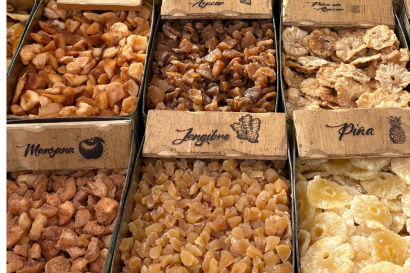I was walking with (female, American) friends last weekend when we passed a club that is popular among University students. We had talked about possibly going dancing that night, so we stopped to ask the bouncer what the cover was.
“For you?” he said in Spanish. “Nothing.” (I’ve been told that the entrance fee is typically seven dollars).
Pricing, I’ve learned, is sometimes flexible in Ecuador. Taxi drivers don’t typically use the meter; it’s better to negotiate the price beforehand. When I bought a pair of shoes a few weeks ago, there was no price tag; the shopkeeper told me they cost $25 but that she’d give them to me for $20.
When prices in Ecuador are set, they tend to be much cheaper than what I am used to in the United States. A one-way bus ride anywhere in Quito is 25 cents. A typical lunch might be three dollars; my friends and I once got a four-course meal (empanadas, a traditional soup, chicken and rice, a dessert and a drink) for eight dollars. I got a manicure here for the first time in my life because it only cost five dollars.
But when the prices are negotiable, the amount you pay seems to depend a bit on who you are. In some cases—like going clubbing—white woman like myself pay less. My friends and I call this gringa-privilege. (Gringo or gringa is the term that Ecuadorians use to describe white foreigners).
Other times, being a gringa means we pay more. My face signals to taxi drivers and vendors that I have money, so they give me a higher price than they give to someone who looks Ecuadorian.
Getting “gringa-priced” is something that foreigners in Ecuador try to avoid. At the beginning of the semester, our IES Abroad program took a trip to Otavalo, a town a few hours north of Quito famous for its artisanal market. Our program director advised us to bargain with the vendors there—they’re used to dealing with tourists and certainly jack up the prices for foreigners.
I did negotiate with vendors in Otavalo and I came away with cute clothes, art, and an alpaca toy for my young cousin—all at much lower prices than anything I would get in the United States. Still, I have to admit that I felt a bit uncomfortable bargaining, and as I have learned more about Ecuador in the last month, I have begun to understand gringa-pricing more.
Minimum wage in Ecuador is $375 a month, which assuming 40-hour work weeks translates into about $2.30 per hour. But not everyone makes minimum wage. The informal work sector occupies a large portion of the Ecuadorian economy; the vendors in Otavalo aren’t salaried employees, nor are most taxi drivers. And while Ecuador has a relatively low unemployment rate (around five percent at the end of 2016), the underemployment rate is quite high—around 20 percent. In essence, prices in Ecuador are cheap compared to the United States because labor is less expensive here, which means that Ecuadorian workers simply don’t get paid as much as their American counterparts, even when performing comparable work.
So while I enjoy getting my nails done and marvel at the cheap costs of food, a manicure is still a luxury here. Plenty of people can’t afford to eat in a restaurant, or struggle to put food on the table at all.
While in Otavalo, I hesitated over buying the alpaca for my cousin (I wasn’t playing hard to get, just trying to decide if she’d even appreciate it), and the vendor dropped the price from eight dollars to five. I ended up paying five and taking the toy. In economics terms, it was a mutually beneficial transaction. But I also couldn’t help but feel mildly guilty because three dollars probably mean more to her than they do to me.
In some ways, gringa-pricing in Ecuador is essentially asking foreigners to compensate Ecuadorian labor the same way they would workers in their own countries. Whether this practice is correct is a philosophical question that I don’t know how to answer. I don’t like paying more for things than I have to, and paying a few extra dollars to taxi drivers or vendors isn’t going to end poverty. Still, navigating my privilege is a huge part of my experience in Ecuador—and gringa-pricing gives me a lot to think about.

Jessica Piper
I grew up in Colorado, but moved across the country to attend college in Maine. I'm an economics and Hispanic Studies double major with a minor in math, but writing is my real passion. I work for my college newspaper and have done other work for several blogs, magazine, and websites.








